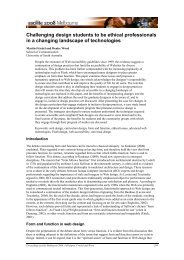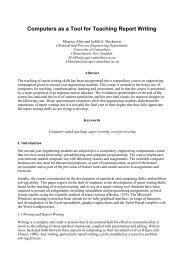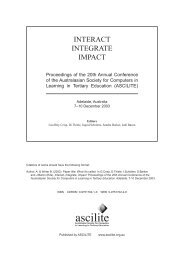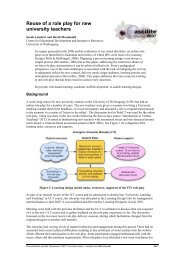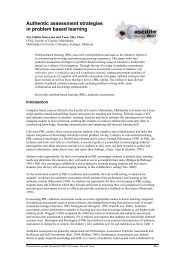Gaming frequency and academic performance - ascilite
Gaming frequency and academic performance - ascilite
Gaming frequency and academic performance - ascilite
Create successful ePaper yourself
Turn your PDF publications into a flip-book with our unique Google optimized e-Paper software.
368 Australasian Journal of Educational Technology, 2008, 24(4)<br />
than frequent gamers (Table 11); or second-year female students, where non-gamers<br />
averaged 10.1% higher than frequent gamers (Table 12).<br />
Table 11: Summary of year of study <strong>and</strong> gamer type for male students<br />
Year of<br />
study<br />
1<br />
2<br />
3<br />
Gamer<br />
type<br />
n<br />
Mean examination<br />
result (%)<br />
1 9 56.2<br />
2 11 56.1<br />
3 145 51.7<br />
4 33 51.3<br />
1 3 58.8<br />
2 10 65.1<br />
3 65 55.2<br />
4 21 54.0<br />
1 2 61.2<br />
2 4 58.7<br />
3 53 61.3<br />
4 13 55.2<br />
Table 12: Summary of year of study <strong>and</strong> gamer type for female students<br />
Year of<br />
study<br />
1<br />
2<br />
3<br />
Gamer<br />
type<br />
n<br />
Mean examination<br />
result (%)<br />
1 32 56.1<br />
2 36 56.8<br />
3 85 55.4<br />
4 3 57.1<br />
1 17 61.1<br />
2 34 59.1<br />
3 53 57.7<br />
4 7 51.0<br />
1 18 60.6<br />
2 26 62.4<br />
3 32 58.8<br />
4 1 55.3<br />
It cannot, of course be stressed enough that while frequent gamers generally appear to<br />
obtain lower marks than non-gamers, there remains no proof that gaming causes any<br />
reduction in <strong>academic</strong> <strong>performance</strong>. Indeed, one could justifiably say that on the<br />
strength of this study, gaming should be considered no more damaging to examination<br />
<strong>performance</strong> than spending excessive time on TV, music, social events, or any other<br />
pastime. Further possible confounding variables include other extra-curricular<br />
activities such as part time employment, <strong>and</strong> mature students with family<br />
commitments – factors which would be worthwhile inclusions in similar future<br />
studies. With these issues in mind, the results should, therefore, be treated with a<br />
degree of caution. In order to substantiate these findings, further in depth, controlled<br />
experiments might offer more conclusive data to uncover specific factors which may<br />
cause a reduction in examination <strong>performance</strong>.<br />
In addition, qualitative investigations into students’ attitudes towards gaming will<br />
certainly help to facilitate a stronger verification of the relationships between gaming<br />
<strong>and</strong> <strong>academic</strong> <strong>performance</strong>. Additional follow up techniques such as in depth<br />
interviews <strong>and</strong>/or focus groups would be particularly appropriate for regular <strong>and</strong><br />
frequent gamers where trends of relatively poor examination <strong>performance</strong> exist.



